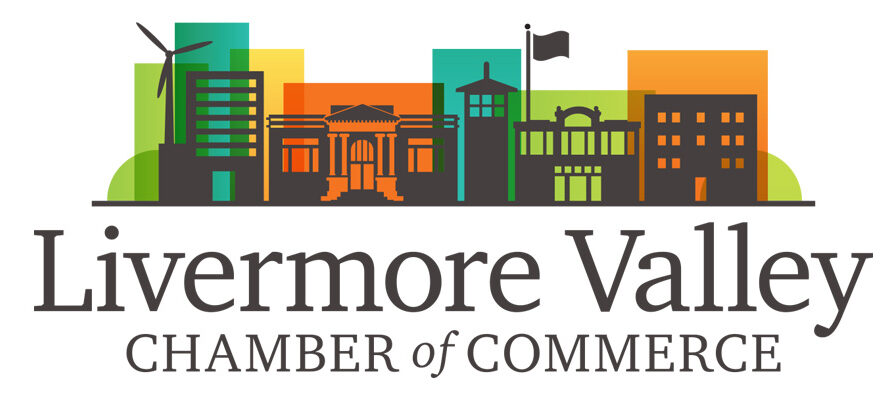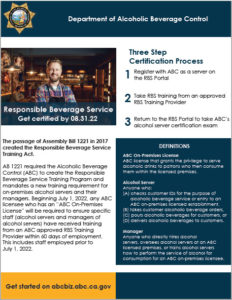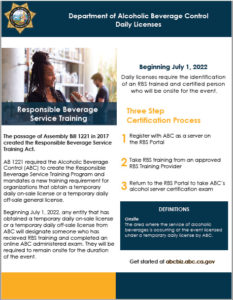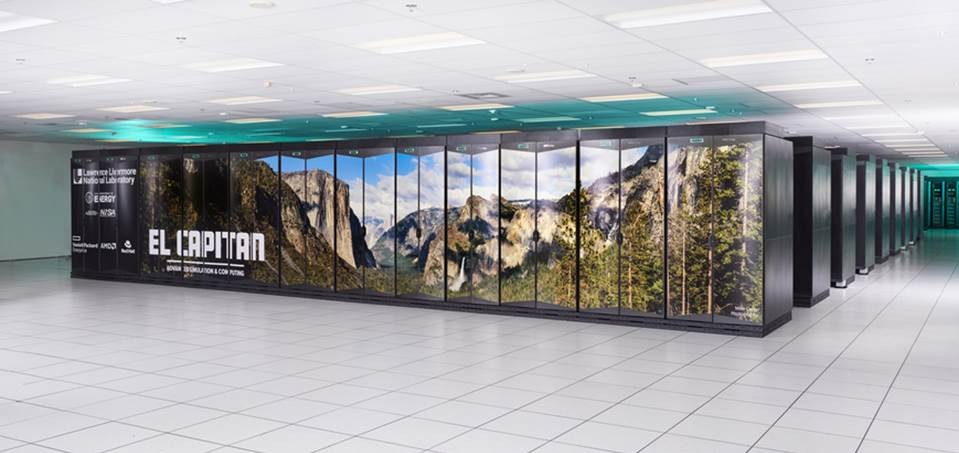California has one of the largest alcohol markets in the United States with over 56,000 businesses in California that sell alcohol on-site. These businesses have a sizable impact on the California economy.
Beginning July 1, 2022, the Responsible Beverage Service Training Act will go into effect. The law requires that anyone who serves alcohol, manages servers, delivers alcohol, takes orders, or checks IDs at a business that serves alcohol on-site must be trained to serve alcohol legally and safely to the public by August 31, 2022. The law authorized the California Department of Alcoholic Beverage Control (ABC) to establish the Responsible Beverage Server Training Program (RBSTP). Under the program, every alcohol server and their manager must have a valid Responsible Beverage Server (RBS) certification from ABC.
They can accomplish this through a three-step process:
- Register with ABC as a Server on the RBS Portal
- Take RBS training from an approved RBS Training Provider
- Return to the RBS Portal to take ABC’s alcohol server certification exam.
You can begin step one by registering with ABC through the RBS training portal.
The RBSTP educates servers on how best to check identifications to prevent sales of alcohol to people under the age of 21, prevent over-serving to patrons, and ensure no one leaves the location in an obviously intoxicated state. These measures can reduce alcohol-related harm in our communities.
“The RBS training program is designed to provide licensees, managers, and servers with the tools and knowledge needed to promote responsible consumption, reduce youth access to alcohol, and make communities safer,” said ABC Licensing Division Chief Jaime Taylor.
Alcohol servers and their managers play an important role in public safety. If alcohol isn’t served responsibly, it can lead to overserved patrons or illegal sales to underage persons and put the public in danger. The California Legislature approved Assembly Bill 1221, the Responsible Beverage Service Training Act after a tragic drunk driving collision took the lives of two University of California San Diego medical students and injured three more. Furthermore, data from the Centers for Disease Control show that 9,288 people were killed in drunk driving crashes between 2009 and 2018 in California.
The first state to establish a mandatory alcoholic beverage service training program was Oregon in 1986. By 1989, more than half of Oregon’s servers had been trained, and single-vehicle nighttime crashes had been reduced by 23 percent according to a joint study from the Prevention Research Center and the University of Minnesota. A 2016 study from the Rutgers University Center for Alcohol Studies found that the states with a responsible beverage service program that were studied saw a total 3.8 percent decrease overall in fatal crash ratios of underage drivers.
AB 1221 requires that five mandated training topics must be included in any RBS training program run by RBS training providers approved by ABC. The topics include the social impact of alcohol, the impact of alcohol on the body, state laws and regulations related to driving under the influence, intervention techniques to prevent the service or sale of alcohol to underage or intoxicated patrons, and instruction on the development of management policies.
ABC protects communities through education and by administering prevention and enforcement programs designed to increase compliance with California’s alcoholic beverage laws. The department hopes tragic alcohol-related incidents are reduced by approving RBS training providers who meet the strict set of standards mandated by law.









Leave A Comment